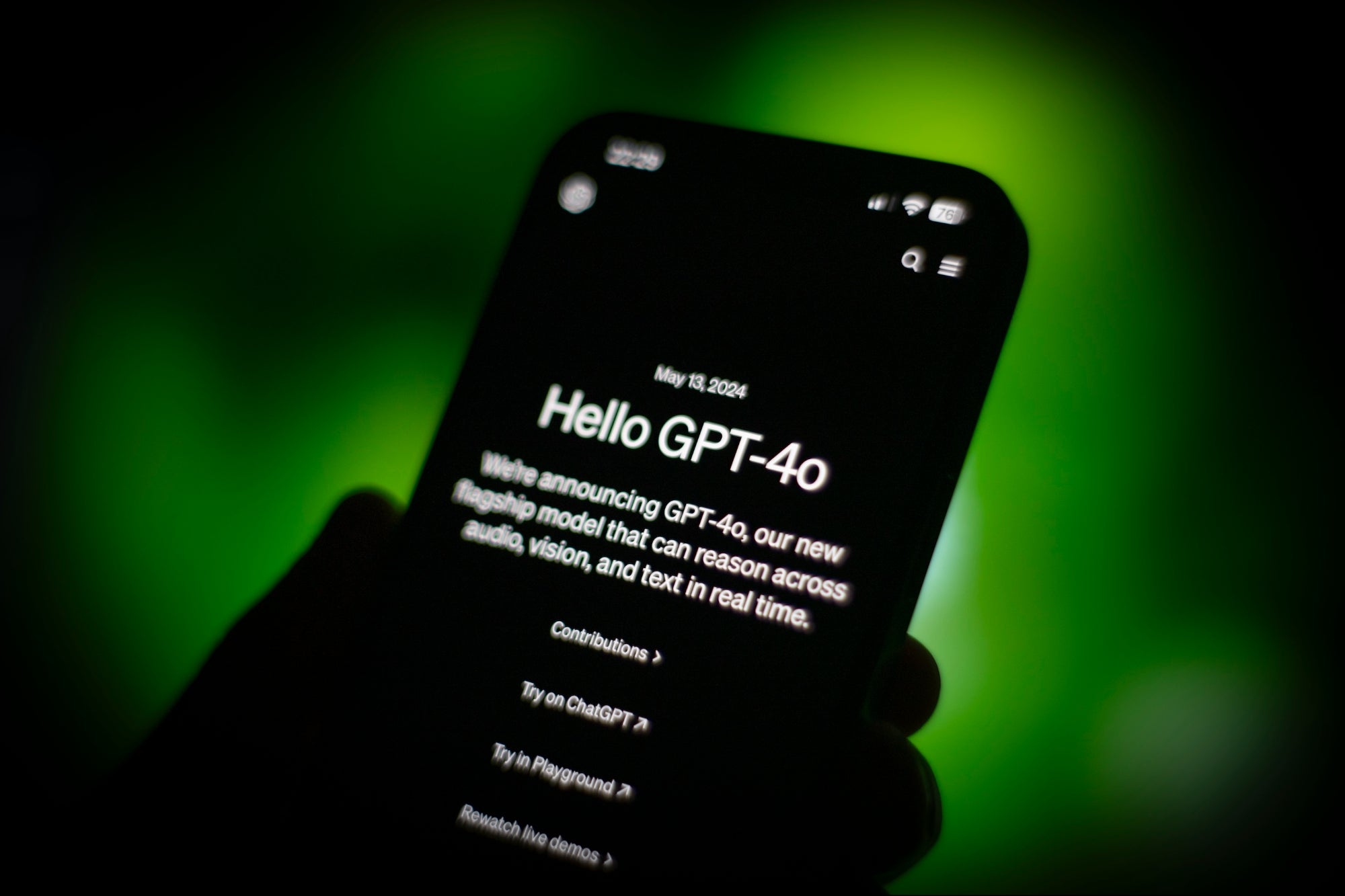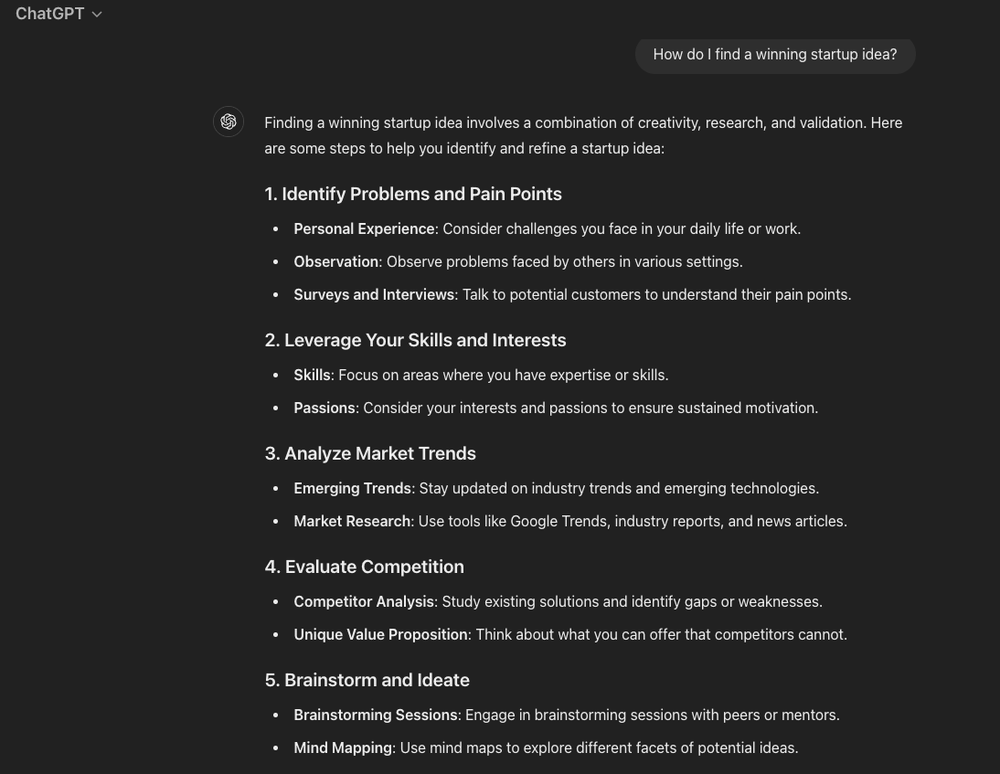Investing
Can ChatGPT Help Start a Business Compared to Y Combinator?

In June, I took Y Combinator’s Startup School, a series of free online classes that teach startup ideation and growth from the famed accelerator that helped launch Reddit, Airbnb, and Instacart.
But since OpenAI released GPT-4o, the latest version of ChatGPT, in May, AI has been touted as a tool for everything from interview prep to homework help. Previous versions of ChatGPT were already able to assist with digital marketing and brainstorming business ideas.
With a record 5.5 million entrepreneurs filing new business applications last year, and millions more applications on the way this year, can ChatGPT help first-time founders navigate their first hurdles? And if so, how does it compare to human-led teaching?
Related: How to Start Your Dream Business This Weekend, According to a Tech CEO Worth $36 Million
Although ChatGPT hasn’t been without controversy (it was accused of sounding “eerily similar” to Scarlett Johansson and its release has raised questions about the protections people have over their likenesses), as GPT-4o rolls out to more users, it could be useful for aspiring business owners.
In fact, OpenAI CEO Sam Altman was heavily involved with Y Combinator, working as its president from 2014 to 2019 and announcing the Startup School while he was there.
GPT-4o has a paid version that costs up to $25 per month and a free version, but free users have limits on how many messages they can send and how much access they have to advanced features. I used the free version.
Related: Y Combinator Helped Launch Reddit, Airbnb and Dropbox. Here’s What I Learned From Its Free Startup School.
Here’s how the two compare across a few commonly asked questions.
Prompt: Should I launch a startup with no experience?
ChatGPT (the free version of GPT-4o): ChatGPT’s answer was more thorough and easily understandable than I expected. Instead of a paragraph, ChatGPT gave me a step-by-step answer with bullet points — a general overview.
The complete answer. Credit: OpenAI/ChatGPT
The AI chatbot gave me the pros (learning experience, passion and motivation, fresh perspective) and cons (risk, steep learning curve, resource management). It offered steps to mitigate the risks of not having experience, like taking courses, networking, and conducting research. It recommended relevant resources too, including the book, “The Lean Startup” by Eric Ries.
Y Combinator: In the first class called “Should You Start A Startup?”, Y Combinator’s Harj Taggar said that in his experience, successful startup founders are not defined by where they went to school or how confident they appear — the most important thing is that they are resilient.
Taggar’s advice addresses the emotional core of the question: “Can I do this without doing this before?” could actually mean “Am I good enough to try this?”
His response could speak to deeper imposter syndrome and help someone realize that even if they haven’t started 300 companies or created a billion-dollar business yet, they still have what it takes to launch a startup.
Related: Microsoft AI CEO Says Almost All Content on the Internet Is Fair Game for AI Training
How do I find a winning startup idea?
ChatGPT: Once again ChatGPT provided more of an actionable overview, which could be a good starting point. It had a multi-step answer for the question, starting with identifying problems and pain points and going all the way to assessing the market size and feasibility of the idea. The eight steps were brief and open-ended.
 A partial answer. Credit: OpenAI/ChatGPT
A partial answer. Credit: OpenAI/ChatGPT
For example, step No. 6 was “Validate Your Idea” with the bullets:
- “Minimum Viable Product (MVP): Create a simple version of your product to test the market”
- “Feedback: Collect feedback from potential users and iterate based on their input”
- “Pilot Programs: Run pilot programs to gauge interest and feasibility”
Y Combinator: Human advice was more specific and helpful. In the “How to Get and Evaluate Startup Ideas” class, Y Combinator group partner Jared Friedman articulated the “why” behind winning startup ideas more clearly: 70% of the top 100 Y Combinator companies, including DoorDash and Stripe, found their ideas by noticing them.
“The problem is that when people sit down and try to think of startup ideas, they tend to think of bad ones,” Friedman said.
Friedman advised potential founders to work at startups, to build interesting things on their own, and to try to build expertise on a topic to find the right ideas.
Related: How a $10,000 Investment in AI Transformed My Career and Business Strategy
Conclusion
ChatGPT, though it may sound and look more human than ever, is still more of a one-stop web search than a business mentor — for now. While it can be helpful and complement human business advice, I found that, so far, it does not replace the invaluable experience of learning from an expert, especially a Y Combinator partner.
It condenses what you would find in a small business ideas article or a similar piece, and lacks nuance of human responses to the same questions.
According to Dario Amodei, the CEO of $18 billion AI startup Anthropic, it takes about $100 million to train AI now. In the next three years, Amodei anticipates that it will take $10 billion to $100 billion, and only then will models become better than “most humans at most things.”
In the meantime, AI carries the hidden cost of greater greenhouse gas emissions, though it could play a role in reducing emissions in the future. The massive amounts of training data it requires, and its potential to cut human work, have also raised concerns.
For a technology that uses tremendous resources, ChatGPT requires strong use cases. While ChatGPT can write, lead advertising campaigns, fuel side hustles, and act as a good starting point for answers to startup questions, this brief experiment shows that it can’t yet replace human answers and expertise.
Still, business leaders are optimistic about the technology.
“I’m more excited than worried about AI,” Sir Richard Branson told Entrepreneur last month. “I think it’s going to transform people’s healthcare, it’s going to transform operations, it’s going to transform many, many aspects of life.”
Related: SoftBank CEO Says AI 10x Smarter Than Humans Could Be Here in a Matter of Years
Read the full article here

-

 Side Hustles7 days ago
Side Hustles7 days agoWhy the Best CEOs Think Like Anthropologists
-

 Side Hustles5 days ago
Side Hustles5 days agoThis User-Friendly H&R Block Software Package is Only $40, While Supplies Last
-

 Investing5 days ago
Investing5 days agoTikTok faces US ban deadline as users brace for fallout By Reuters
-

 Passive Income4 days ago
Passive Income4 days agoTrain for a New Tech Career in 2025 With This $25 Course Bundle
-

 Personal Finance6 days ago
Personal Finance6 days agoDecember inflation clouds Fed's outlook on interest rate cuts
-

 Side Hustles6 days ago
Side Hustles6 days agoSupreme Court TikTok Ban: What to Know, January 19 Deadline
-

 Personal Finance7 days ago
Personal Finance7 days agoCalifornia's homeowners insurance industry faces rough road ahead as wildfires continue
-

 Passive Income6 days ago
Passive Income6 days agoUse These ChatGPT Prompts to Boost Your Amazon Sales


















